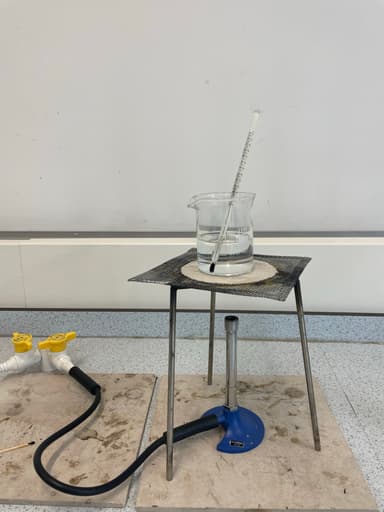Myths about teaching can hold you back
- Year 10
- AQA
- Higher
Thermal conduction and insulation
I can explain how energy is transferred by thermal conduction in metals and non–metals.
- Year 10
- AQA
- Higher
Thermal conduction and insulation
I can explain how energy is transferred by thermal conduction in metals and non–metals.
These resources were made for remote use during the pandemic, not classroom teaching.
Switch to our new teaching resources now - designed by teachers and leading subject experts, and tested in classrooms.
Lesson details
Key learning points
- The faster the particles of a substance are vibrating or moving, the higher the substance's temperature.
- In solids, energy is transferred by vibrating particles colliding with nearby particles, causing them to vibrate more.
- Metals are good conductors as their free electrons move through them more quickly when heated and transfer energy.
- Thermal conductors can feel cold because they transfer energy quickly away from their surface.
- Thermal insulators can feel warm because they do not transfer energy quickly from their surface.
Keywords
Heating - causes the particles of a substance to move or vibrate more rapidly
Thermal conduction - the transfer of energy through a material due to collisions between moving or vibrating particles
Thermal insulation - reduces the transfer of energy by thermal conduction
Thermal conductors - substances that transfer energy by thermal conduction quickly
Thermal insulators - substances that transfer energy by thermal conduction slowly or not at all
Common misconception
Pupils often do not accept that all objects left in a room for a long time are the same temperature.
Provide opportunities to consolidate the understanding that particles vibrating with more energy transfer some of that energy to particles with less energy through collisions and when bonded together in a solid.
To help you plan your year 10 physics lesson on: Thermal conduction and insulation, download all teaching resources for free and adapt to suit your pupils' needs...
To help you plan your year 10 physics lesson on: Thermal conduction and insulation, download all teaching resources for free and adapt to suit your pupils' needs.
The starter quiz will activate and check your pupils' prior knowledge, with versions available both with and without answers in PDF format.
We use learning cycles to break down learning into key concepts or ideas linked to the learning outcome. Each learning cycle features explanations with checks for understanding and practice tasks with feedback. All of this is found in our slide decks, ready for you to download and edit. The practice tasks are also available as printable worksheets and some lessons have additional materials with extra material you might need for teaching the lesson.
The assessment exit quiz will test your pupils' understanding of the key learning points.
Our video is a tool for planning, showing how other teachers might teach the lesson, offering helpful tips, modelled explanations and inspiration for your own delivery in the classroom. Plus, you can set it as homework or revision for pupils and keep their learning on track by sharing an online pupil version of this lesson.
Explore more key stage 4 physics lessons from the Energy of moving particles unit, dive into the full secondary physics curriculum, or learn more about lesson planning.

Licence
Prior knowledge starter quiz
6 Questions
Q1.Which of the following is a unit of temperature?
Q2.What is the boiling point of pure water?
Q3.When a metal block is heated, the size of which energy store increases?
Q4.A very hot brick is taken out of an oven and placed in a room which is at 20°C. Which of the following statements correctly describes what will happen?
Q5.A cold glass of milk taken out of a fridge at 4°C and is placed in a room, which is at 20°C. Which of the following statements correctly describes what will happen?
Q6.Why does the liquid in a thermometer move up the glass tube when its temperature rises?
Assessment exit quiz
6 Questions
Q1.Match the following key words or phrases to their definition.
causes the particles of a substance to move or vibrate more rapidly
energy transfer in a material due to particle vibration or movement
reduces how quickly energy is transferred by thermal conduction
substances that transfer energy by thermal conduction quickly
substances that transfer energy by thermal conduction slowly
Q2.Which of the following materials is the best thermal conductor?
Q3.Why are metals good thermal conductors?
Q4.Four rods made from different materials (copper, glass, aluminium, steel) have wax on one end. The other ends are heated with a Bunsen burner. On which rod will the wax start to melt last?
Q5.A material made from wood fibres can be used as an insulating material. Why is the material used to reduce energy loss?
Q6.The mat used during experiments with a Bunsen burner is sometimes called a ‘heat proof mat’. Why should it be called a ‘heat resistant mat’ instead?



